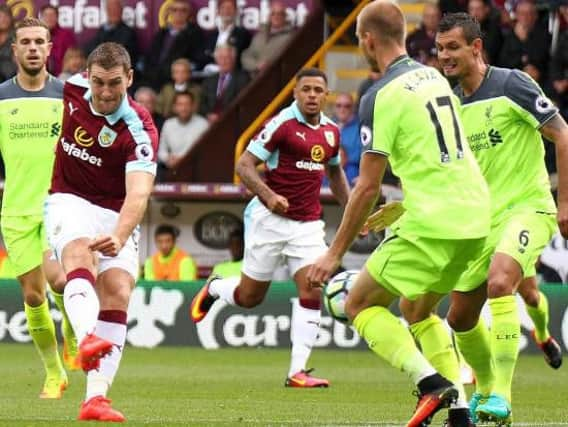Transition is the key - Dyche


Since Opta stats began in 2003, no team has won a Premier League game with such a small share of the ball, though the only statistic that counted against the Reds was the Clarets scoring 100% of the goals.
Dyche has long been of the opinion that pressing is the new passing, and he feels Burnley's transitions - the ability to move from defence to attack, and vice versa - will be crucial to their success in the top flight this season.
Advertisement
Hide AdAdvertisement
Hide AdLooking back at the win over Liverpool, he said: "We have different stats, ours was 28% possession, but the main stat is the scoreline.
"The difference is teams are now playing more football away from the goal, a lot of possession and not always looking to penetrate, or trying to penetrate by keeping the ball and making the opposition lose their shape, or come out of their shape.
"You've got to know when to press, that's the secret.
"We pressed well for the first goal, and the second with the breakaway.
"The knowledge base is when to press, and how to work on transition.
Advertisement
Hide AdAdvertisement
Hide Ad"I said three years ago transition is the future of football, not because I had a crystal ball, but I felt that was how the game was going, how quickly you can turn attack into defence, defence to attack.
"Reforming your shape to defend, breaking from your shape to attack.
"I spoke many times about that need for transition – but obviously, I’m Sean Dyche!"
https://mobile.twitter.com/mrSheqiri/status/768154010322923520/video/1There is thought behind the pressing, not just running around closing the opposition down like headless chicken, and though Burnley choose the ideal moment to press, their running stats remain as high as ever: "Their physical stats were really strong against Liverpool. We were actually pressing, but if you come out of shape too early those top players will pick you off. Not all teams will do that to you, but some of them will because they have so much talent.
Advertisement
Hide AdAdvertisement
Hide Ad"The two boxes are where it’s all happening, because loads of teams can do well in the middle bit. I think Leicester were a shining example of that. They were superb at defending their own box and clinical at the other end."
Burnley now know they can keep a top opponent at arm's length and retain a threat, which appears an improvement on two seasons ago: "That’s learning, and developing as a group. And experience of course. Some of our players are still here from the last time. We’re finding different ways to win
– we did that last season. And it’s not just about what we ask them to do. It’s about using their own game knowledge.
"Each game plays out differently, and you’ve got to be flexibly-minded. During a game is
Advertisement
Hide AdAdvertisement
Hide Adwhere your trust in the players comes in, if you need to alter the shape depending on how the game’s going.
"At half time of course you can tell them what you see is happening, but it’s up to them to change things as they’re playing too. We do have some obvious tactical options, but player knowledge is an important thing and I thought they did that very well last season.
"It’s important to know how to play a game like (Liverpool). We were 2-0 up pretty early, so do you go for three, four or five, against Liverpool? I don’t think you do.
"So at half time the directive was quite clear – we defend with the right shape, the right mind, which
Advertisement
Hide AdAdvertisement
Hide Adincludes the ability to attack, particularly on the counter. And four or five times in the second half we were inches away from getting another opening.
"Each game changes, and we’ve learned that as a team, and as a staff."